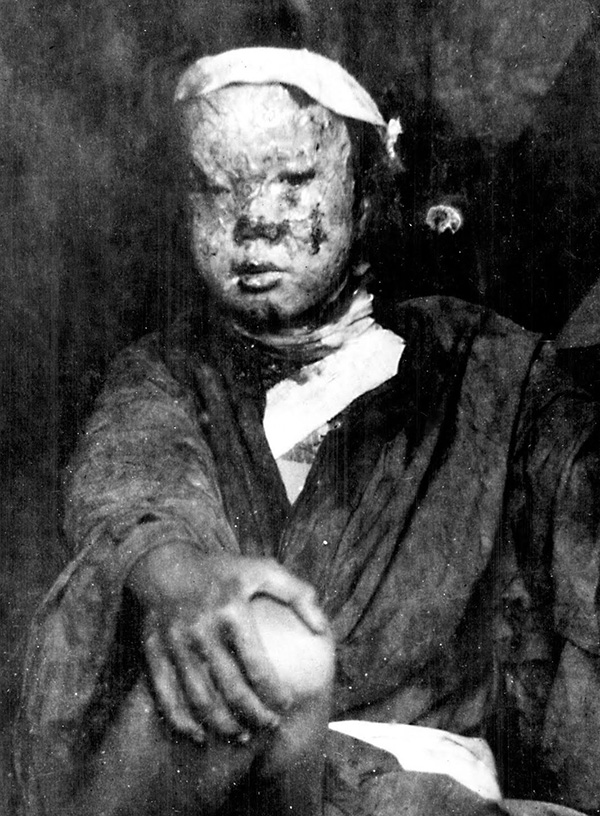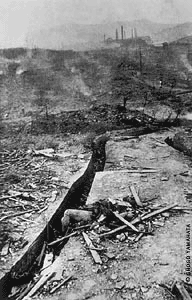 |
I had been mobilised as a student worker at the Mitsubishi Shipbuilding Company. There were five of us working in the superintendents office at the Katsu-ura plant which made torpedoes at the time. Even if an air-raid siren sounded we were supposed to keep working until the enemy planes showed up. Therefore I was like all the others still at my desk. We had been told to stand by. There was a tremendous flash. At first I thought it might be magnesium. We used to ignite magnesium at the factory in experiments. Being young I was first into the hallway and lay down in front of a wall. Those who came after received glass cuts to their heads. After that we evacuated to the dugout. It was a zigzag one and the superintendent sat furthest inside and I sat next to him. They tried to contact the outside many times, but received no reply. I was frightened not knowing what had happened. Just then several people came to the dugout and told us that everything had vanished around Urakami. A lot of people were asking if this was the same type of bomb that had hit Hiroshima. Many injured came to the dugout and we waited there until the all-clear sounded. We went outside. I was stunned to find out that there was nothing as far as the eye could see. The entire residential area that had covered the foot of the mountain had gone. A seaman gave me a lift to my lodgings. It was still standing with partial damage of fallen walls. A medical student who lodged there was wounded. The other a pharmaceutical student never returned. I went to the office the next day. I was unable to get away as someone from the army was visiting us to get some confidential documents. I was asked to deliver some drawings. There were fires here and there. It was so hot I had to wear a hood. My head became hot and I became infested with lice. While I worked at the Company, I saw bodies carried away everyday. It was like hell. A middle-aged woman in my neighbourhood had became insane. She screamed all the time, Here comes an aeroplane, here comes an aeroplane. Looking back now it was a miracle that I had not been killed. But at that time I was so desperate to live day by day, I never felt sad or merciless. |
Soon after the war ended my mother and sister returned from Korea. It was November 1945. Though we were starving all the time I was so happy we were together again. Compared with the loneliness the food shortage mattered little.
My father came back to Japan in 1947 and we moved to his hometown, Awaji Island. However he had to work and live in Osaka to support us. It was not until 1948 until we could be together at last.
I was married the next year. I have never in fifty years been free of radiation disease. People in the blast get osteoporosis at an early age. Today I still fight and suffer the pain in my knees. Every August 15th I cook dango soup to remember those days. It was popular when food was scarce.
After the interview: Mrs. Makisaka is a energetic speaker. Had she been born later she would be a career woman of today. If only there was no war, things would be so different. After many hard , tough years she lives a peaceful life growing vegetables. She said, After experiencing hell we understand the importance of self sufficiency. We should suppy our own needs. It is a great pity she has trouble with her knees. It is 50 years since the end of the war. Meeting Mrs. Makisaka made us feel sad to know that people have been suffering since then.
September 30th 1994 Interviewer - Tsuyako Tateishi of Nakagawa-machi, Fukuoka City
My blooming youth was discoloured by the war - Kazuko Watayama
At that time I was working at the Mitsubishi Foundry as a mobilised student worker. Before that I had worked digging dugouts day after day. I was fourteen when the blast occurred. I had not gone to foundry that day, as I had swollen tonsils. I was placed in charge of the form and stayed at school. It was a beautiful day that day. I was supposed to go and see the doctor at the era, nose and throat hospital On Naka street. My mother said that it was going to be a hot day and that I should go early. By not feeling like going I was still at home. Rice was scattered in the garden. Also Father was a seaman and squid he got were hanging to dry to preserve them as rations. My younger brother was out with friends. Our neighbour was outside heating water for a bath and my mother was talking to her. They saw and aeroplane and smoke in the sky. They were saying, That can’t be an enemy plane because there was no air-raid siren.
 |
It was right then that a tremendous flash and explosion occurred. I though they were aiming at our house. Had I been at the hospital I would have died for sure.
Around our neighbourhood in Tateyama-machi there was a lot of tangerine trees. The trees were all burned on top. The rice and the squid had all blown away. So were the shoes at the entrance porch. The man next door had been working on his roof. Stripped to the waist as he worked his back was burned and peeling. Others in the town were also badly burned. I lay down in the kitchen. It was indeed a terrible experience. The bomb had blown down the wall next door and our wardrobe. From this my sister had a bleeding head wound. My younger brother came home from the park. He was not injured but was upset in seeing the house had been almost destroyed. |
My father and four year old sister were moved to Katsuyama elementary school for treatment and my mother went with them. I was supposed to look after my one year old sister and brother. There was a tremendous amount of smoke and ashes coming from Inasayama. A lot of people came over the mountain with awful blisters on their backs that burst and bled. Some of our neighbours had gone shopping to Abura-machi were never found they must have been in a tram.
Other neighbours had a daughter who had been working in a factory in Urakami. Her face had been so badly burned she was unrecognisable. At that time it was said that the vermilion ink used for stamps was good for burns. She put ink on her face and was somehow saved, but her family died soon after from the radiation. I seemed that the radiation effect was worse for those who had got wet with the black rain.
We moved out to Ikanoura where my mother had an acquaintance. It took us five hours to get there. We were strafed several times on out way there. Every time we were attacked we hid in a ditch. When I was there I had radiation sickness. I had diarrhoea and was shocked to find all my hair fall out.
Above all the worst experience was the shortage of food. Sometimes nowadays public excitement runs high over he shortage of rice. But I never worry about it, as at that time there was a real shortage. Potato leaves were too soft to boil we were happy to get a potato shoot.
Where did the bloom of my youth go? I never had one. It was discoloured by the war.
We later moved to my fathers hometown in Amakusa and lived there for many years. After that I worked at a department store. Now I live a quite life with my family but have always been frightened about the after-effects of radiation.
After the interview - In spite of her horrible experience Mrs. Watayama is a cheerful woman. She openly told us of her experiences of being in the blast. She seems to be a busy woman but has anxieties about her health. Many of her friends have died and she has headaches and pains in her legs. She is concerned that this is the after-effects of radiation disease or signs of cancer. One thing that impressed me was that she said the A-Bomb victims association has given her the opportunity to make friends with many people. She says that their association with each other is as intimate as one with ones family which helps her overcome a lot of difficulties.
I respected her positive way of thinking. In her a saw a new blade of grass growing from the burnt field made barren by the atomic explosion. I want to applaud her for her soul and power of life. I wish her health and happiness for many years to come.
September 30th 1994 Interviewer - Emiko Inoue of Nakagawa-machi Fukuoka City